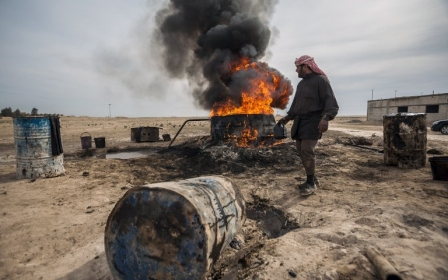PKK urges Kurd unity in face of advancing IS militants

The outlawed Kurdistan Workers' Party (PKK), which for years waged a deadly insurgency against Turkish authorities, called on all Kurdish armed groups in the region Tuesday to unite against Sunni militants in northern Iraq.
"Our efforts alone are not enough. There must be a joint (effort)" against the Islamic State (IS), the PKK's military leader Murat Karayilan said in remarks carried by the Radikal online newspaper.
His comments came after IS raised its black flag in the northern Iraqi city of Sinjar on Sunday after ousting the peshmerga troops of the Iraqi Kurdistan government.
"Let's form a joint command. Let's make preparations and take IS out of the areas it occupied, including Sinjar," said Karayilan, who heads the military wing of the PKK.
Karayilan also said peshmerga forces in northern Iraq could play a role. "They are better equipped. We can create a significant force."
On Monday, Baghdad's air force and Kurdish fighters from Syria joined forces with Iraq's embattled peshmerga to fights the militants.
Karayilan singled out main Kurdish parties in Iraq -- the Kurdistan Democratic Party and Patriotic Union of Kurdistan -- as well as the Kurdish People's Protection Units in Syria as needing to unite against the militants.
Tense relations among Kurds
"We are ready to make every sacrifice... (we) could do this all together. We can support and join it. Our specialised forces could take part," he said.
The Syrian Kurds and the peshmerga have had tense relations in the past and there was no evidence the two groups were coordinating efforts to retake Sinjar.
Among the strategic gains achieved by IS over the weekend were the town of Zumar, near Mosul lake, and at least two nearby oil fields.
In a statement, IS warned they could seek to push further into Kurdish-controlled areas.
In June, Iraq's Kurds snuck in behind retreating government troops to grab land.
Iraq Kurds out of their comfort zone
But the move dragged Kurdistan's peshmerga out of their comfort zone and the force is now taking heavy losses along its extended front.
"They've bitten a whole chunk of cake that's going to take a long, long time to digest," said Toby Dodge, director of the Middle East Centre at the London School of Economics.
The autonomous region of Kurdistan in northern Iraq expanded its territory by around 40 percent when it took the slipstream of soldiers fleeing the militant onslaught launched on June 9.
Kurdish political commentator Asos Hardi said IS "is aware that the United States is backing plans for Sunni-Shiite-Kurdish cooperation" against them.
"They are trying to secure the area where the borders of Syria, Iraq and Turkey meet but that cannot be achieved without trying to expand into Kurdish regions," he said.
Issam al-Faily, a political scientist from Baghdad's Mustansiriya University, said the Kurds should not assume that militants will not seek to enter their turf.
Heavy losses
In the town of Jalawla, Kurdish troops have taken some of their heaviest losses in recent days.
On several occasions, they fought for hours to hold a position, only to pull back for lack of ammunition.
In a matter of hours on Saturday, the peshmerga abandoned their positions in Zumar, two oil fields, the large town of Sinjar and other smaller towns and positions.
The Syrian Kurdish group PYD that crossed the border to come to their rescue on Monday said it briefly took in 700 peshmerga back into Syria to regroup.
"The peshmerga are well-trained, well-equipped and motivated, but definitely more efficient fighting in defensive positions, on their own terrain, than projecting into the plains of Arab Iraq," said Peter Harling, from the International Crisis Group think tank.
"Quite simply, they were never meant for that," he said.
Stay informed with MEE's newsletters
Sign up to get the latest alerts, insights and analysis, starting with Turkey Unpacked
Middle East Eye delivers independent and unrivalled coverage and analysis of the Middle East, North Africa and beyond. To learn more about republishing this content and the associated fees, please fill out this form. More about MEE can be found here.




